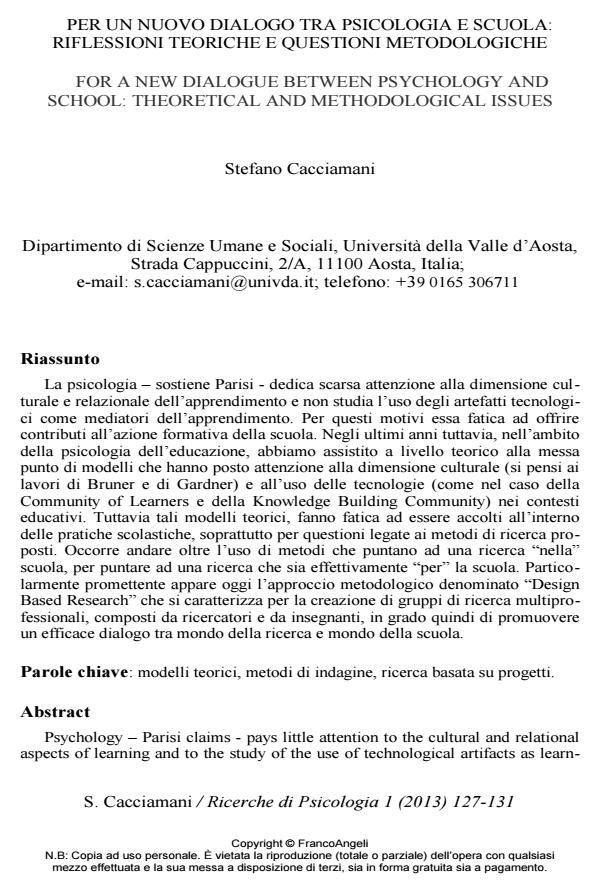For a new dialogue between psychology and school: theoretical and methodological issues
Journal title RICERCHE DI PSICOLOGIA
Author/s Stefano Cacciamani
Publishing Year 2013 Issue 2013/1
Language Italian Pages 5 P. 127-131 File size 159 KB
DOI 10.3280/RIP2013-01007
DOI is like a bar code for intellectual property: to have more infomation
click here
Below, you can see the article first page
If you want to buy this article in PDF format, you can do it, following the instructions to buy download credits

FrancoAngeli is member of Publishers International Linking Association, Inc (PILA), a not-for-profit association which run the CrossRef service enabling links to and from online scholarly content.
Psychology - Parisi claims - pays little attention to the cultural and relational aspects of learning and to the study of the use of technological artifacts as learn- ing facilitators. For these reasons it has difficulties to make contributions to the school activities. In recent years, however, in the field of the psychology of education, we have seen the development of theoretical models that consider the cultural dimension (e.g. the work of Bruner and Gardner) and the use of technology (such as in the case of the Community of Learners and Knowledge Building Community) in educational settings. However, these theoretical models rarely have been accepted within the school practice, especially for issues related to the research methods. We need to go beyond the use of methods oriented to make research activities "in" school, to point to a research that is actually "for" school. Particularly promising is today the methodological approach called "Design Based Research", which is characterized by the creation of multi-professional research teams, composed of researchers and teachers, and thus able to promote an effective dialogue between the research community and schools.
Keywords: Theoretical models, research methods, Design Based Research
- Scardamalia, M., & Bereiter, C.(1999). Schools as knowledge-building organizations. In D. Keating & C. Hertzman (Eds.), Today’s children, tomorrow’s society: The developmental Health and Wealth of Nations (pp. 274-289). New York: Guilford.
- Wang, F. & Hannafin, M.J. (2005). Design-based research and technology-enhanced learning environments. Educational Technology Research and Development, 53(4), 5-23. DOI: 10.1007/BF02504682
- Anderson, T. & Shattuck, J. (2012). Design-Based Research: A Decade of Progress in Education Research? Educational Researcher 41, 16-25. DOI: 10.3102/0013189X11428813
- Brown, A.L., & Campione, J.C. (1994). Guided discovery in a community of learners. In K. Mc Gilly (Ed.), Classroom lessons: Integrating theory and classroom practice (pp. 229-270). Cambridge (MA): The MIT Press/Bradford Books.
- Bruner, J. (1997). La cultura dell’educazione. Milano: Feltrinelli.
- Gardner, H. (1987). Formae mentis. Saggio sulla pluralità dell’intelligenza. Milano: Feltrinelli.
- Gardner, H. (1999). Educare al comprendere. Milano: Feltrinelli.
- Scardamalia, M. (2002). Collective cognitive responsibility for the advancement of knowledge. In B. Smith (Ed.), Liberal Education in a knowledge society (pp.76-98). Chicago, IL: Open Court.
Stefano Cacciamani, Per un nuovo dialogo tra psicologia e scuola: riflessioni teoriche e questioni metodologiche in "RICERCHE DI PSICOLOGIA " 1/2013, pp 127-131, DOI: 10.3280/RIP2013-01007